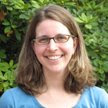
By: Nicole Hobbs, Intern
As a student at Seattle University, I have had the great pleasure of taking Gary Chamberlain's class: Religion & Ecology. [Gary Chamberlain is known for his book, Troubled Waters which details the global water crisis from a theological and humanitarian perspective]. Originally, I took the class because I thought it would be an easy A--write a few papers, volunteer a few hours, and take a few tests. Wow--was I wrong. Over the past five weeks, I have realized that this class is going to be one of my toughest yet (and I'm in my senior year) because of the sheer impact it has had on my thoughts, practicies, and beliefs. Sustainability and saving the environment is not just about recycling my bottles and taking the bus, instead it is about cherishing the interconnectedness of the planet God has given us.

We recently had Dr. Sallie McFague spend the morning with our class. Dr. McFague is "widely recognized as one of North America’s preeminent feminist theologians and eco-theologians" and her newest book is titled: A New Climate for Theology: God, the World, and Climate Change.
Dr. McFague grew up during the Great Depression, and she fell in love with nature from an early age. Her parents had a one room cabin the the woods and would often take their children there to introduce them to nature. Sallie then mentioned that she was worried that parents and children today just don't do the same thing. Instead we are attached to video games, the internet, and television. This shift from enjoying the natural gifts of the world to the technological creations of our society--is one of the reasons Sallie gives for humanities lack of concern from the planet. She told us that if children and parents could once again see the gifts of nature, the gifts from God then they would feel sad watching the natural world disappear and would shift their actions to help protect it. It is sad when I think of my own childhood, void of natural experiences, and I realize what Sallie is saying is true.
The second story that I can share is from when Sallie was ten years old. Dr. McFague knew from a young age that she wanted to be a pilot in the Navy. Now, at the time, women were not allowed to be pilots and this troubled her. She said that she just knew in her heart that this was wrong, and she knew that she would one day change this and become a pilot. The moral of her story is this: if enough people stand up and say no (and have that instinct that something is wrong) then thats how we will see environmental change. Now, being a bunch of college students we were quick to challenge her.
We expressed how overwhelming the problems facing our environment are and we challenged her to give us a more detailed solution to the problem. What could we actually do?! She smiled and simply said: its not about doing everything, instead its about doing something and doing what you are good at. You don't need to become a staff member of Earth Ministry to change the world, instead use your own passions and talents (whether they be in marketing, accounting, or sports) to change the world around you.
Its okay to do something small because in this large connected world it adds up.















